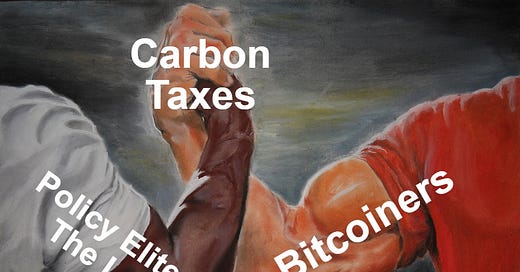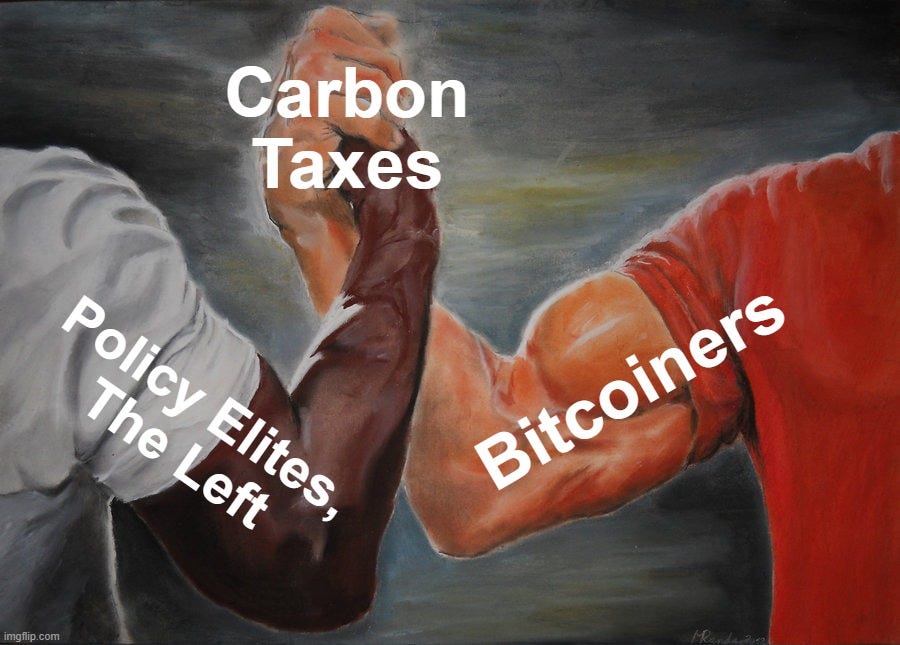There are two important issues with Bitcoin’s energy use:
First, the legitimacy of its carbon footprint and energy consumption (0.1% to 0.2% of CO2 emissions [1] and ~0.55% of global electricity [2]). The discussion here is whether proof-of-work (POW) – the use of computing power and electricity to validate and maintain the decentralized bitcoin ledger – is a waste or not. This is a normative and political debate. For most people, it boils down to whether bitcoin serves a valid purpose and whether that purpose justifies the environmental costs.
Second, the potential effects of bitcoin mining on renewable energy adoption and economics. Here, there’s the discussion about the extent to which bitcoin mining can use renewable energy that would otherwise be wasted (curtailed) due to lack of demand (for instance with stranded hydropower or flared gas) and what the consequences of that might be.
Also, there’s a related debate about whether bitcoin mining can reduce black-outs and increase the resilience of greening electric grids that have increasing supply instability from renewables (especially solar) or have volatile demand (from extreme weather, for example) [3].
In this post, I’ll instead argue that bitcoiners should support carbon taxation, an idea that is good and would be good for the world and good for bitcoin.
What counts as legitimate electricity use?
It’s tricky. Before long, you're knee deep in discussions about:
what the meaning of ‘legitimate/ illegitimate’ is
how we can know what counts as ‘legitimate/ illegitimate’ and
what the nature of claims about legitimacy/ illegitimacy is
Luckily, as an economist, I can ignore the meta-ethics and just state my policy preferences: No consumption of non-renewable energy is fully legitimate as long as there aren’t carbon taxes and the negative environmental externalities of emitting CO2 into the atmosphere remain uninternalized by consumers. Without carbon taxes, markets don’t allocate resources efficiently because the price of carbon emissions are too low and lead to over-consumption of the limited CO2 absorption capacity of the atmosphere.
What are negative externalities? Are CO2 emissions negative externalities?
When a chemical plant dumps industrial waste into the river, users of the water downstream incur costs. Riverside real estate loses value, towns need to upgrade their water purification and public health deteriorates. The costs incurred by anyone other than the chemical plant and its customers are called negative externalities and they are one reason why markets don’t always automatically work.
Carbon emissions into the atmosphere are a massive negative externality. Every time we drive a car, eat meat, or do virtually anything else, we do not pay for the costs of adding carbon dioxide to the stock of CO2 in the atmosphere. And as the stock of CO2 rises, so does the average temperature of the earth and the associated adaptation and mitigation costs, which are conservatively estimated at hundreds of billions of dollars per year.
We all individually benefit from the goods and services that make up modern life. However, we don’t individually pay even a fraction of the costs of our personal carbon emissions — these costs are spread across tens of billions of people over the next century (if you include the unborn). Thus, unrestrained carbon emissions are the greatest market failure and negative externality.
What are Pigouvian taxes? Can they help?
In general, economists prefer direct (or ‘first-best’) ways of dealing with externalities, particularly those that tackle the problem at the source, like a tax on pollution. These taxes are called Pigouvian taxes after the English economist Arthur Pigou, and are better than indirect (or ‘second-best’) policies that are often ad-hoc and have undesirable effects but are sometimes more politically viable.
Pigouvian taxes on pollution raise the costs of polluting which reduces pollution in aggregate. They also raise revenue for the government, which can be used to deal with the pollution, among other things.
It’s no surprise that economists on both sides of the aisle support carbon taxes, a Pigouvian tax on carbon emissions. Greg Mankiw, the legendary conservative economist, Harvard professor and Chair of the Council of Economic Advisors under George W. Bush said:
When you emit carbon, you are basically using up a resource, a valuable social resource, which is the atmosphere, and what we want you to do is to pay for that resource you use up when you are buying that high carbon-intensive product.
Mankiw even created the so-called Pigou club, a group of economists and pundits from all political inclinations that support carbon taxes. On the left, policy elites and a lot of politicians (like Bernie Sanders) also support carbon taxes.
What does Bitcoin gain from carbon taxes?
In a world with sufficiently high and global carbon taxes, Bitcoiners wouldn't have to justify the value of the network, POW, mining or argue that the technology is worth its environmental costs, something most people aren't particularly convinced by. With carbon taxes, Bitcoiners would (a) simply pay for the environmental costs of their non-renewable energy consumption, fair and square, like everybody else and (b) face strong incentives to continue migrating away from coal and non-renewables to renewables. This is good, not bad, for the bitcoin industry.
Sponsoring carbon taxes, mobilizing political and financial capital in support of the idea and trying to strengthen the bi-partisan consensus on the need to raise the costs of atmospheric pollution would also itself increase the legitimacy of bitcoin as a technological or monetary project.
Bitcoiners want mass adoption of the digital currency, and some even advocate for so-called ‘nation-state adoption’. To achieve any of this, supporting carbon taxes and significantly reducing the carbon footprint of mining is crucial.
Of course, carbon taxes would also simply accelerate the global transition to net zero in an economically efficient way and be straightforwardly good for the world. As a result, I think Bitcoin and POW networks are natural allies for carbon taxation. Sure, global carbon taxes would raise the costs of mining, but mostly for the dirty miners that use highly carbon-intensive energy, namely coal, that the greener miners don’t want to compete with in the first place.
Are carbon taxes politically viable in America and the world?
For the last 30 years, they haven’t been, no. Matt Yglesias has written a lot on the subject (e.g. here, here and here) and basically argues that even though it's a great idea and even if there is bipartisan consensus on it among policy elites — especially economists — voters dislike it because it raises the price of driving and meat and other things voters enjoy. Noah Smith is even less excited about carbon taxes. In a viral piece last year, he called on economists to stop fetishizing over the idea because it's a political non-starter.
It’s true that carbon taxes poll badly. However, times have changed, and I think we are living through a unique opportunity to implement them. Firstly, gasoline prices are very high, making it easier, not harder, to start with a very low carbon tax – the equivalent of a few cents per gallon of gasoline – and then raise it when oil prices fall so that drivers get part of the windfall even while the tax is hiked. Counterintuitively, high gasoline prices make raising the carbon tax sometime down the line when oil prices fall less annoying for drivers, which are an extremely important political constituency.
Secondly, for the first time in decades, consumer price inflation is running hot. In this context, some democrats and most republicans are concerned about the federal deficit and unnecessarily large fiscal support for the economy. Thus, implementing a low carbon tax could marginally narrow the deficit and reduce debt issuance if the additional revenue is not fully offset with new spending or tax cuts, cooling demand somewhat. [4]
Of course, carbon taxes also have a crucial international dimension. It doesn’t make sense to tax carbon in the US if no other countries do, because then, the rest of the world ‘free-rides’ on America’s emissions reductions. However, if the US implemented a low enough carbon tax to start with, it probably wouldn't be that hard to get Europe and Japan onboard. Then, with a block that size, there would be leverage to incentivize other countries to follow suit.
In short, carbon taxes are a good idea that can accelerate the transition to net-zero and do so in an economically efficient way. There are compelling, specific reasons why bitcoiners should also support this good idea and why now might be a good time for it.
[1] Lower bound estimate for 2020 from NYDIG ‘Bitcoin Net Zero’ by Carter and Stevens (July 2021). Upper bound from estimate for 2019 from Joule’s ‘Revisiting Bitcoin’s carbon footprint’ by Alexde Vries, Ulrich Gallersdörfer, Lena Klaaßen, and ChristianStoll (March 2022). It’s now 2022, so this range could be outdated and inaccurate.
[2] Estimated by dividing Bitcoin’s annualized electricity consumption of 140 TWh (source: Cambridge) by global electricity production ~26,000 TWh (source: BP Statistical Review of World Energy & Ember via Our World in Data, rough estimate for 2022; data ends at 2020).
[3] The argument here is that bitcoin miners (a) can sign ‘demand-response’ contracts with electricity distributors that force them to shut down when demand is high in exchange for cheaper overall electricity or (b) simply be priced out of buying electricity and shut down when spot prices go high enough, balancing supply and demand.
[4] However, if we are headed into another recession, as the inversion of the yield curve suggests, none of this applies and more taxes would be bad.





Do you know of any studies that try to quantify the elasticity of co2 emissions? In particular, I’m interested in how much co2 emissions would be reduced by a carbon tax. And I would imagine that past changes in prices caused by factors other than taxes can help us estimate this.
The reason this seems important to me is that the only reliable effect of a Pigouvian tax is its effect on consumption. We can hope that the government will then use the money they collect in order to correct the externalities. But I think that’s all we have on that front: hope. This seems even more true when the timeline spans many generations, many governmental administrations, and many crises that inspire profligate spending. How wrong am I on this front? Do you think there is a way to ensure that taxes collected today will be used as intended in a hundred years? Fifty years? Twenty five years?